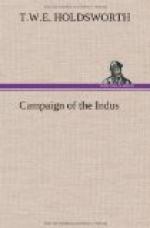manner, as the latter part of the march was a terrible
teaser. We marched off from this place about twelve.
Although we had found the morning pleasant enough,
with a fine bracing breeze, yet in the afternoon,
about half an hour after starting, the wind went down,
and the sun shone out terribly; the sand in some parts
was half knee deep, and although there was no breeze
to blow it in our faces, yet it rose from the trampling
of so many feet in successive dense columns, and completely
enveloped the whole brigade, almost blinding the men,
so that they could hardly see the man before them,
and getting into their noses and mouths so as nearly
to suffocate them; however, they bore it manfully,
and marched straight through it like Britons.
Our encampment that night was at a place called Golam
Shah, on the Buggaur, one of the branch streams of
the Indus. We found that the second brigade had
only left it the same morning, having been obliged
to halt there the preceding day; and General Willshire
found a letter from Sir John Keane, advising a halt
there for the following day, which we accordingly did,
and a precious comfortable day we had. I got off
my pony at the close of this day’s march with
a dreadful headache, and had to wait for an hour till
Halket’s tent and kit, with whom I am doubling
up, arrived. His servants brought me the delightful
intelligence that my camel man had bolted with his
camels at our last encampment, and that my things were
all left there on the ground, with my servant, and
that it was quite uncertain when they would be up;
in fact, it seemed exceedingly doubtful whether they
would arrive at all. However, they did come in
at last, but very late, on three ponies, two bullocks,
and one donkey, which were the only things my boy
could get, and for which I had to pay considerably.
I turned in as soon as I could; and the next day, which
was a most wretched one, I was very unwell. This
place, Golam Shah, must, I think, be one of the most
wretched places in the whole world, situated as it
is in the heart of a desert, with only one recommendation,—viz.,
the river Buggaur, the water of which is excessively
sweet and wholesome. The day we passed at it was
the coldest I remember since leaving England.
A strong northerly wind blew the whole day, and the
clouds of dust and sand that rose in consequence were
so thick as perfectly to obscure the sun, and all
we could do we could not keep ourselves warm.
Here we had the misfortune also to lose the only man
that has as yet fallen on the march, an old soldier.
He was taken with cholera at eight in the morning
and died at twelve at night: he was buried about
six hours afterwards, just as the regiment marched.
The hospital men had no time to stretch him, and he
was laid in the earth in the same posture in which
he died, with his arms stuck a kimbo, pressing upon
his stomach, which shews that he must have suffered
intense agony. Poor fellow! they had not time
to dig his grave very deep, and I am afraid the jackals
will be the only benefiters by his death. We left
this place the next morning, the 30th, and arrived
here (Tatta) about eleven o’clock, a twelve-mile
march. A great number of the 2nd brigade rode
out to meet us, and the 4th Light Dragoons very kindly
asked us to breakfast immediately on our arrival.
You may be sure they had not to ask us twice!




